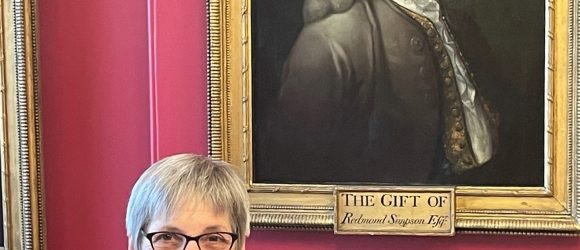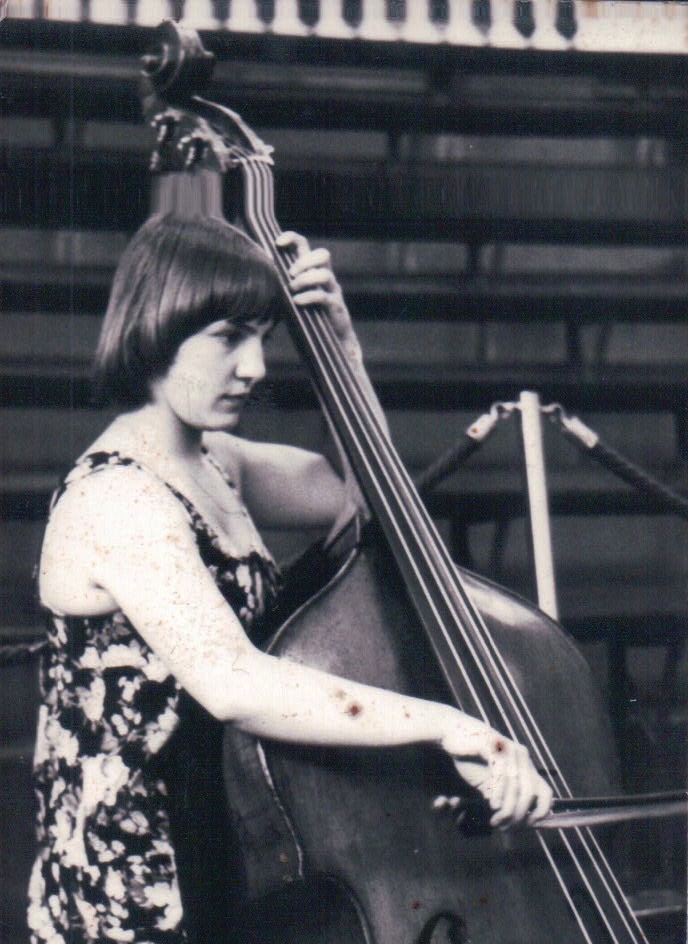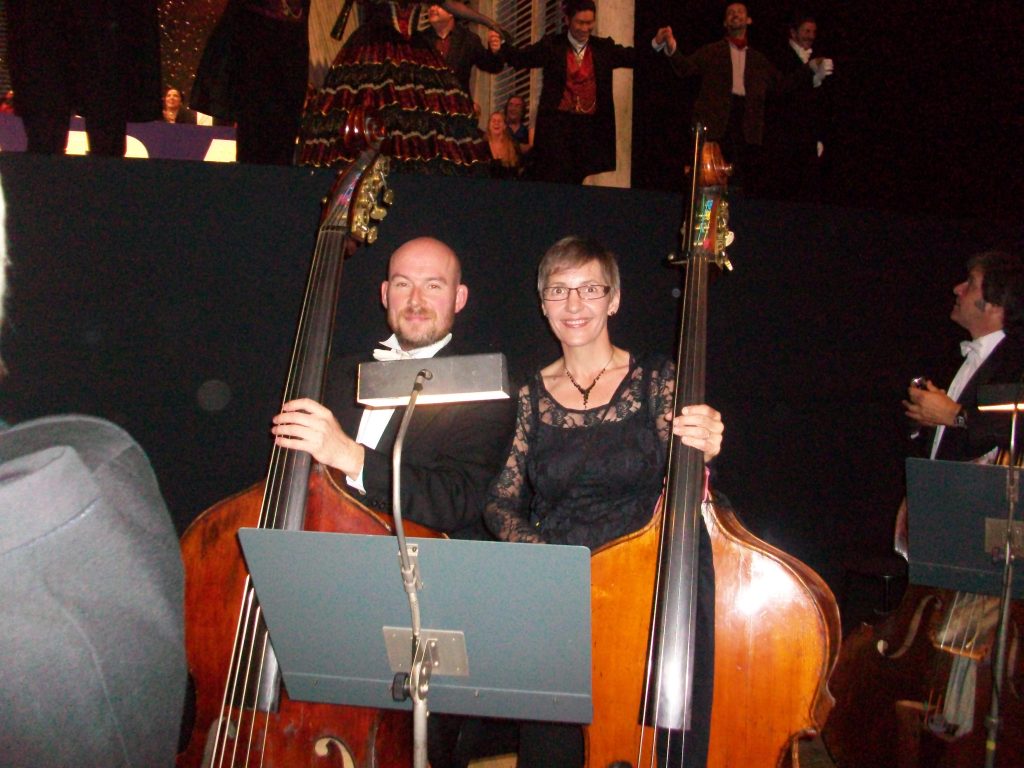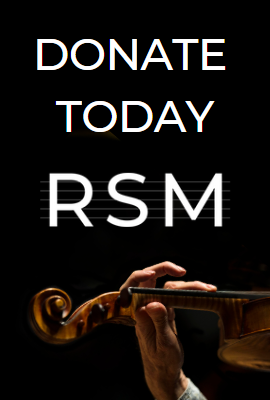RSM People: Clare Tyack

RSM’s Chairman for 2023 Clare Tyack discusses her career in music, the challenge of a busy life as a double bassist and a mother, and how she wants to give back now she has time in retirement.

How old were you when you first became interested in music, and what made you decide to take up an instrument?
My parents were very keen that their children had some kind of musical education, so I was put to the piano at about the age of five. I trundled along with that very nicely, until I got to Secondary School, where I was quite an attention seeker! When the school music teacher pointed to a large instrument in a green bag in the corner of our music room, she asked who wanted to play that, and of course, I put my hand up first. I think I was the only hand. And that was it, that was the beginning of my adventure with the double bass.
When you find you can do something and have some natural ability for it, suddenly you’re standing out in the crowd, so that’s what motivated me to get better and better. I’d grown pretty fast, so by the age of 12 I could just about manage the double bass. I did have to stand on telephone directories when I first started!
I had a very fast improvement track and before I knew it, I was going to junior college on Saturday mornings, getting into youth orchestras and so on. It got its own momentum, I found I was enjoying it, not only the music, but it was also a very useful sociable tool. A great way to meet boys! There were hardly any girls learning the double bass.
From the very start, I just loved the role of the double bass and its place at the foundation of an orchestra. The path to playing in orchestras was very rapid because of it. That fed into my growing love of it.
When did you decide you would like to pursue it as a career and what path did you take professionally?
Other people at school were very clever and went off to university to study various things, but they didn’t have any idea of what they wanted to do after studying. In contrast to that, I always knew where I was heading. I was going to play the double bass and get really good at it, so I got more interested because I could see a very clear vocation ahead of me. All the doors were opening, it seemed obvious.

I studied at the Royal Academy of Music, then I got a job in the City of Birmingham Symphony Orchestra. A couple of years later, I became the principal bass in the BBC Concert Orchestra, bringing me back to London and settling me down a bit – husband, family, house. Suddenly, I had a career as an established player within the profession.
I stayed in the BBC for nine years, which I absolutely loved.
From there I decided to freelance, partly because I wanted to work with some of the really big conductors and they only worked with the large symphony orchestras. And also, family life played a part; we didn’t have any free time at all as my husband and I were both in BBC orchestras, so we didn’t have holiday time together. Something had to give.
I can’t tell you how lucky I’ve been, I worked with some of the most amazing conductors; the likes of Bernard Haitink, Ricardo Muti, Klaus Tennstedt, Günter Wand. These conductors were able to transport you on to another level of engagement with the music when you played for them. You didn’t realise the benchmark was going right up. Daniele Gatti was late for a rehearsal once, so a deputy was conducting in his stead with the RPO. Gatti turned up after the break and without a word, the sound of the orchestra completely changed. I couldn’t explain how he did that; he brought a particular sound spectrum to the orchestra he was conducting. That was so special.
Also, years of amazing touring. A lot of fun, a lot of hard work, never glamorous. It’s very bonding being on tour because the musicians are all in it together, good times and bad. When you’re six hours late because a plane has been delayed, you still have to get the concert on track. You do everything you can to make that happen.

How important is it to help fellow musicians in their time of need and make sure the profession is properly cared for?
I think freelancers and solo artists especially, live in a fairly isolated world when it comes to support. RSM can offer a fantastic family and support group, that musicians in orchestras or other group settings have automatically, the people around them provide the support network they need.
I’ve always had good health and what a blessing that is, which as a freelance player, was a real asset, but I’ve always been aware that colleagues don’t necessarily enjoy that. Now that I’ve retired, I’ve got the time to do something to help those people. It’s time for me to pay back, I suppose. There’s a paradox within RSM that we need Members to reach out during their careers to find musicians in need, but it’s only when you actually retire, that you have time to address the needs of those who need help. It’s also my way of staying connected with the profession.
As an RSM Member, why did you decide to become more involved in its governance?
I was a Member of the Court of Assistants before joining the Governors, and that was invaluable. I honestly don’t think I could have taken on the responsibilities of governing if I hadn’t been a part of the Court of Assistants. Most people say they don’t have the time to join RSM, but as a Member, you don’t need the time. All we ask if that you look out for fellow musicians in need and let us know about them. Being on the board is quite a different commitment! I’m finding it really rewarding work.
What plans do you have for your tenure as Chairman?
I think we’ve got a very effective, forward-looking Board with lots of good ideas and I want to focus those ideas. It’s important to get the views of everyone on the Board.
I want to further develop communications to all areas of our profession, to let them know about what RSM can offer. A lot of people just don’t know about us.
I also want to make the Board more accessible, so that Members don’t think of us as some far-off body that is somehow detached from what they are doing, so I want to bring us back into focus with Members through more communication.
I also want to build our income further, so that we can benefit as many as musicians in the profession as we can, for as long as possible. It’s helped innumerable people in the last 285 years, that’s our whole aim, isn’t it!




